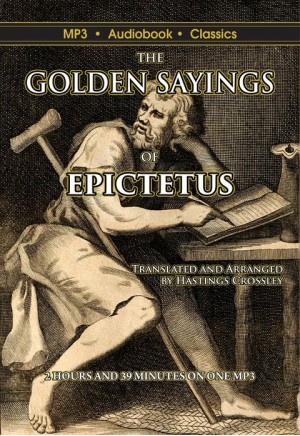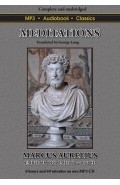| Track | Section | Reader | Length |
| 01 | 01 - Aphorisms 001-021 | Hugh McGuire | 17:06 |
| 02 | 02 - Aphorisms 022-040 | Leon Mire | 14:22 |
| 03 | 03 - Aphorisms 041-065 | Karen Savage | 17:10 |
| 04 | 04 - Aphorisms 066-090 | Chris Masterson | 27:16 |
| 05 | 05 - Aphorisms 091-115 | Katie Gibboney | 21:19 |
| 06 | 06 - Aphorisms 116-140 | Katie Gibboney | 20:40 |
| 07 | 07 - Aphorisms 141-175 | Katie Gibboney | 20:26 |
| 08 | 08 - Aphorisms 176-188 | Doug Wetzl | 20:22 |
Notes
Running Time: 2 hours and 39 minutes
Read by: Multiple readers
Book Coordinator: Hugh McGuire
Meta Coordinator: Hugh McGuire
Artwork
Cover: Imaginary portrait of Epictetus from the engraved frontispiece of Edward Ivie’s Latin translation (or versification) of Epictetus’ Enchiridon, printed in Oxford in 1751.
DVD Inset: Artist impression of Epictetus by Claude Reydellet, engraving by S. Beyssent
DVD Insert: Page 1 of Angelo Poliziano’s Latin translation of Epictetus’ Enchiridion.
DVD Insert: Sketch of Epictetus. Author unknown.
Recordings
These recordings were made using the author’s original published work, which is in the public domain. The readings were recorded by members and volunteers of Librivox.org, which has generously made the recordings available to the public domain. The audio files have been lightly edited and have been engineered using professional audio tools for maximum sonic quality. While Librivox condones the sale and distribution of these recordings, it is not associated with the management or operations of MP3 Audiobook Classics.
- Download and read the eBook online at Gutenberg.org
- Download our PDF datasheet
- Read How to Be A Stoic by Elif Batuman in the New Yorker
The Golden Sayings of Epictetus is a collection of almost 300 aphorisms culled from his Discourses and the Enchiridion. There are no known written works by Epictetus. His discourses were transcribed by his pupil Arrian, who wrote them down from memory after lessons “to preserve it as a memorial, for my own future use, of his way of thinking and the frankness of his speech.” The compilation of discourses ran to eight books, of which four have survived. The Enchiridion is a handbook or digest of the contents of the Discourses. One should think of the Golden Sayings as a further distillation of the Discourses.
Epictetus was a philosopher in the Stoic school. He made a core distinction between things within our power and things over which we have no power. He held that the basis of philosophy is self-knowledge, and that the only things within our power or those we generate from within – impulses, opinions, desires and aversions, which he groups together as “opinions”. Everything else is out of our control and subject to fate. Good and evil rests in the power of choice. Reason alone is good; one should understand not only what to do, but why. Application of reason in the choice of action over things within our power is the path to finding peace of mind in all things.
The philosophy of Epictetus as embodied in the Golden Sayings has been an influence on and inspiration to leaders in all walks of life, from the Roman Emperor Marcus Aurelius to James Joyce, J.D. Salinger, Tom Wolfe and David Mamet in more modern times.
Play sample:
Download our PDF datasheet
| Item Info | |
| EAN - DVD case | 0684758936417 |
| EAN - CD jacket | 0682550992174 |
| Media | MP3 CD |
| Package | DVD box |
| Author | Epictetus (AD c. 55 - 135) |
| Translator | Hastings Crossley |
| Recording | |
| Read by | Multiple readers |
| Length | 2 hours and 39 minutes |
| Type of Reading | Collaborative |
The Golden Sayings of Epictetus
- Author: Epictetus
- Product Code: DB-1082
- Availability: In Stock
-
$9.99
Available Options
Related Products
The Meditations of Marcus Aurelius
One hears the term Roman Emperor, and at once the very bad ones come to mind: Caligula, Nero, Domiti..
$9.99








